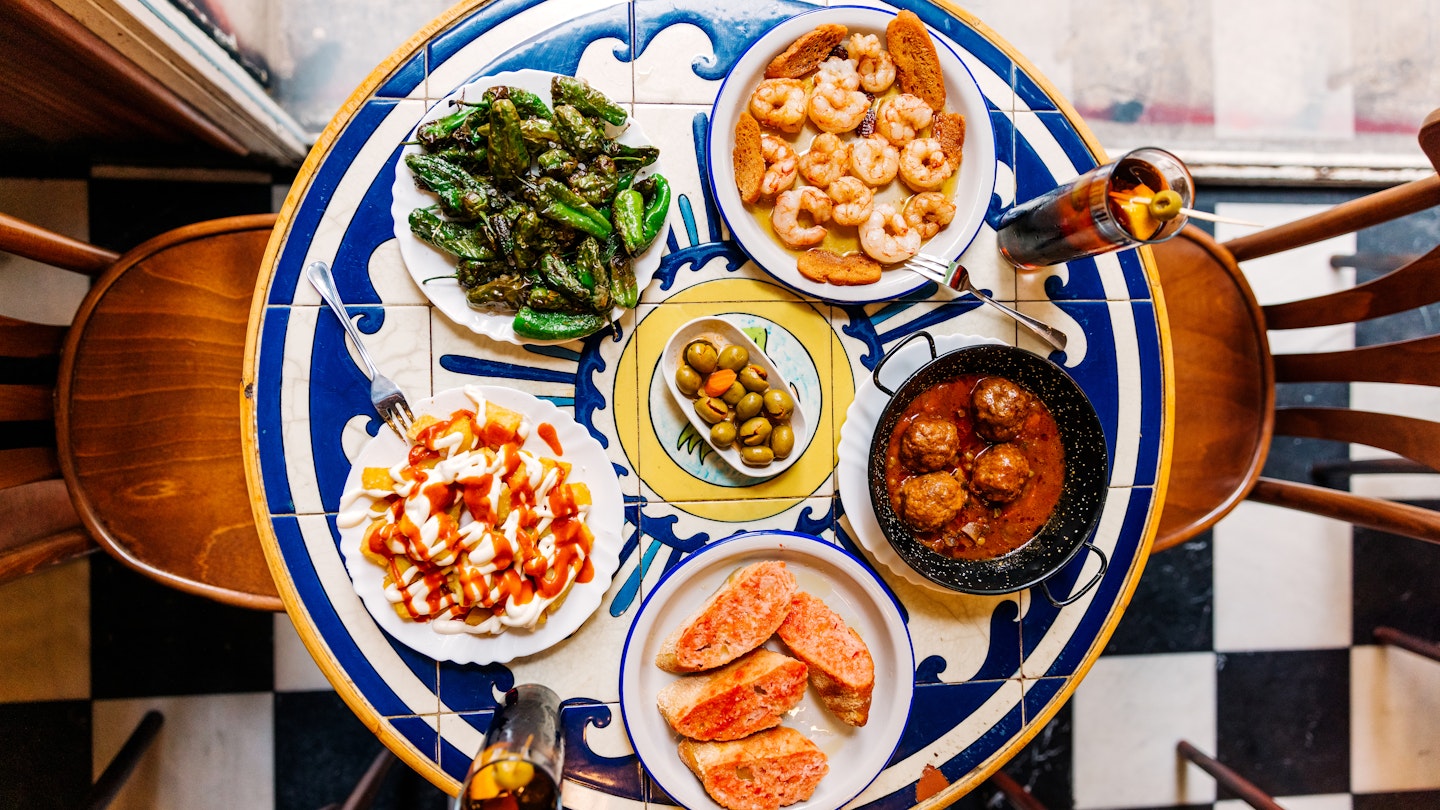Discover Spain’s Culinary Capitals
Zesty olive oils, boat-fresh seafood, one-of-a-kind sherries, herb-infused cheeses, and some of Andalucía’s most irresistible tapas—this is just a taste of what awaits in the soulful southern Spanish town of Sanlúcar de Barrameda, recently named the 2022 Capital Española de la Gastronomía (Spanish Capital of Gastronomy).
Sanlúcar de Barrameda, Andalucía
Picture this: you’ve crammed into a bustling tapas bar, and then a wafer-thin, shrimp-filled fritter fresh with chopped parsley and onions appears on the countertop. This is Cádiz province’s beloved tortillita de camarones, a signature specialty in salt-scented Sanlúcar, perched at the mouth of the Río Guadalquivir in western Andalucía. Even better when washed down with a glass of manzanilla, the Atlantic-influenced sherry produced only in Sanlúcar.
Fried acedías (plaice) and chocos (cuttlefish), arroz con pato (rice with duck), and seafood-fueled stews like arroz caldoso count among Sanlúcar’s endless delights. Velvety local potatoes pop up in papas aliñás, a punchy potato salad dressed with olive oil, onion, parsley, Jerez vinegar, and, typically, melva (tuna). Dive into it all at the lively Plaza del Cabildo, where buzzing tapas bars spill out onto a sprawling terrace, or stroll along Bajo de Guía, the celebrated open-air restaurant boulevard strung along the Guadalquivir.

Murcia
Tucked between Andalucía and Valencia, with almost 300km of sun-washed Mediterranean coastline, Murcia is famous for its magnificent huerta (Moorish-era vegetable gardens), always-fresh seafood, and delicious bomba rice. Here in Spain’s 2020-21 gastronomic capital, you’ll savor frito murciano (pisto), fresh sardines, pastel de carne (a meat-stuffed pastry), paparajotes (fried battered lemon leaves), and glorious arroces (rice dishes), served with game meat inland and seafood along the coast.
Logroño-La Rioja
Having snagged the original gastronomic crown in 2012, La Rioja offers much more than some of Spain’s finest red wines. This tiny northern region’s cuisine centers on locally grown vegetables (potatoes, cauliflower, asparagus, wild mushrooms), succulent meats, and pork products. Hit the pintxo bars around Calle del Laurel in elegant Logroño for a delectable experience.
Toledo, Castilla-La Mancha
Toledo, renowned for its splendid architecture, is also a gem of interior-Spain gastronomy. The region’s cuisine features Manchego cheese, rich meats, savory stews, and fuss-free ingredients. Must-try dishes include stewed partridge, cochifrito (stewed-then-fried lamb), and arroz a la toledana (rice with pork).
Huelva, Andalucía
Wedged between Seville and Portugal, often-overlooked Huelva city won Capital Gastronómica in 2017 for its seafood-rich cuisine. Fried chocos, exquisite jamón from the Sierra de Aracena, and locally grown strawberries fuel Huelva’s bounty.
Vitoria-Gasteiz, Basque Country
Vitoria-Gasteiz, crowned in 2014, combines an unstoppable food scene with a lively, art-and-monument-filled old town. Experience fresh Basque ingredients and a blend of traditional flavors infused with creativity in its gastronomic scene.
León, Castilla y León
While sharing similarities with Burgos’ cuisine, León puts its unique twist on beloved recipes. Standout ingredients include cecina (a jamón-like cured cow’s meat) and pungent Valdeón cheese made in the Picos de Europa mountains. León’s Barrio Húmedo (old town) is one of Spain’s liveliest tapas hubs, offering diverse culinary delights.
Menorca, Balearic Islands
Awarded 2022 European Region of Gastronomy, Menorca is a powerhouse of Spanish cuisine. Fresh, local ingredients and a sustainable ethos have been at the core of Menorcan cuisine for centuries. Explore Menorca’s inspiring food scene through local markets and top restaurants.
Cáceres, Extremadura
On the border with Portugal, little-touristed Extremadura produces some of Spain’s most prized jamón ibérico. The ancient city of Cáceres delights with artisanal Torta del Casar cheese and other local culinary treasures.
Burgos, Castilla y León
The rich, inland flavors of this north-central jewel revolve around locally sourced meats and Burgos-made queso fresco (cow’s cheese). Head for packed city-centre tapas bars or seek out restaurants that offer innovative spins on local produce.




